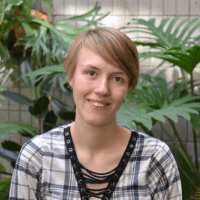
“Plastoglobular Atypical ABC1 Kinase Function”
Project Summary:
Plastoglobules are lipoprotein particles that are present in all plastid types. They contain specialized proteomes and metabolomes, and play a variety of important roles in plastid biogenesis, homeostasis, senescence, and stress response. Their proteome includes six atypical ABC1 kinases (K1,3,5,6,7,9). These ABC1K are of unknown molecular function, though they clearly play an important role, as mutants lacking various combinations of these proteins show an array of phenotypes, such as pale leaves, reduced photoautotrophic ability, and sterility. We utilized a segregating population of Arabidopsis thaliana (A. thaliana) heterozygous for k1, k3, and k6 in various combinations to better understand the dosage effects and genetic interactions of K1, K3, and K6 and elucidate their molecular function. Additionally, it has not yet been confirmed that an insertion in K6 is the cause of the pale phenotype. We will verify this by complementing mutant A. thaliana with wild type K6. Simultaneously, we will investigate if a conserved autophosphorylation inhibitory domain is important for K6 function. It has been shown that in the yeast homolog of mitochondrial K13, disruption of this domain will not complement the mutant. Therefore, this domain is hypothesized to be necessary for protein function. Combined, these two projects will help us understand the molecular function of these elusive ABC1K, and the function of plastoglobules as a whole. Given the breadth of processes plastoglobules are involved in, improving the understanding of plastoglobules and proteins within them may lead to opportunities to target plastoglobules for genetic modification to improve crop species.
My Experience:
Over the last ten weeks, I’ve gained so much from this research experience. My mentor, Elena Michel, has taught me a variety of new lab techniques and procedures, and challenged me to become a better problem solver and a more independent researcher. It has been incredibly rewarding to work through the entire research process from start to finish. Additionally, this program has given me the resources and connections to feel confident in applying to graduate school. I’ve had the chance to network with numerous graduate students, professors, and other faculty, who were more than happy to help guide me and answer my questions. It’s been wonderful to be surrounded by so many great people who share my passion for plant biology and research. I’ll cherish the experiences I’ve had here for a long time.
